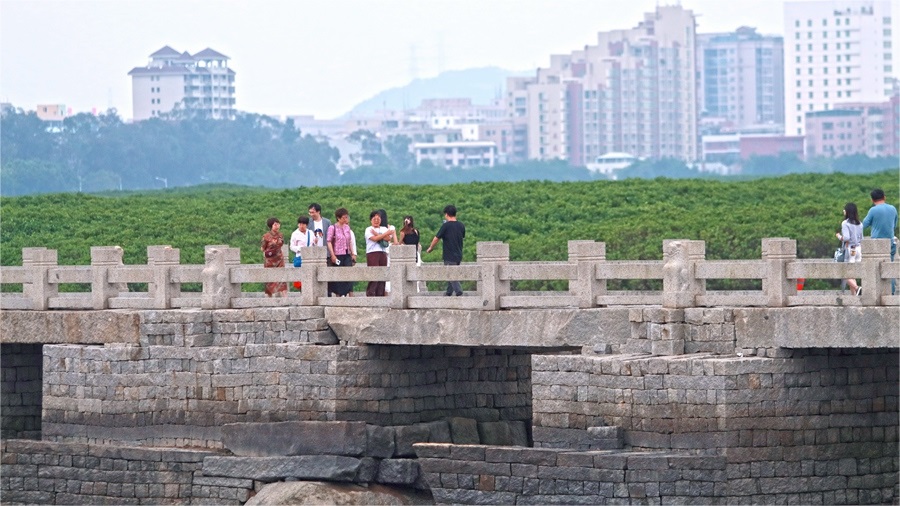Letter from China: Theaters shine bright in mountainous county
NANCHANG, May 8 (Xinhua) -- As a self-proclaimed gourmet of rice noodles, I was previously unaware of the existence of Huichang, a region in China renowned as the "land of rice noodles."
Situated in the mountainous region of Jiangxi Province in eastern China, this small county boasts a rich agricultural history. In fact, it accounts for over 60 percent of China's rice noodle exports, with a thriving market in Europe and North America.
However, it was not the delectable rice noodles that piqued my interest in this remote destination, home to a mere population of 530,000. Rather, it was the vibrant art scene, particularly drama and theater.
This January, the long-anticipated Huichang Theatre Village opened its doors to the public, attracting hundreds of thousands of active playgoers from all corners of the country.
The theater village was established in the old downtown area of Huichang. This ambitious restoration project involved converting the traditional ancestral temple and outdated printing house into theaters, adding a touch of cultural heritage to the village. Additionally, the bungalows that lined the streets have been repurposed into restaurants, offering tourists a taste of the region's unique local cuisine.
By adhering to the principle of preserving classical charm while making necessary repairs, the village retains a sense of elegance and its traditional aesthetics.
Stan Lai, an acclaimed American-born Chinese playwright and director, played a pivotal role in the establishment of the theater village.
Huichang is the ancestral home of Lai. He embarked on this endeavor as a means of contributing to the development of his hometown via theaters and plays.
In his endeavor to promote the village, Lai integrated traditional local cultural elements into his works. This includes a tea harvest opera version of his classic play "Secret Love in Peach Blossom Land," which has now become a regular occurrence in the village's performances.
The staging of several of Lai's plays, including "The Village" and "Flower in the Mirror, Moon in the Water" has captivated both local residents and visitors from afar.
Within less than half a year, this themed village has hosted troupes from countries such as Italy, France, and Spain, embracing over 3.5 million visits and registering a staggering daily visit count of 200,000.
During the just-concluded five-day May Day holiday, the village saw an influx of over 250,000 travelers from provinces such as Guangdong, Fujian, Zhejiang and Liaoning, as well as various regions in Jiangxi.
During my evening stroll through the village, I met Wang Suping, a middle-aged woman who was raised in Huichang.
Despite spending over a decade in urban areas for education and work, Wang still vividly remembers the original downtown area of the county, every building, and every street in great detail.
For Wang, the theater village represents more than just nostalgia. She expressed her delight at having such an international theater village in her hometown. "It's so good to be able to see many masterpieces in Huichang."
Wang shared her experience of taking her daughter to enjoy a captivating magic bubble show from Italy and a string puppet performance, an intangible cultural heritage, from the city of Quanzhou.
Accessibility to world-class theaters without the need to travel has become a source of joy for Wang and many others in the county. In the eyes of the local community, the village has emerged as the center of civic life, providing a space for leisure and entertainment for residents.
For the younger generation in Huichang, the theater village holds more significance than just a venue for performances. It is a platform for realizing their dreams.
Zhu Chen, a young professional in her 20s, is now an integral part of the village's technical department.
After spending several years studying and working in bustling metropolises like Shanghai, Zhu made a firm decision to return to Huichang, and the theater village was the catalyst for her decision.
"If it weren't for the theater village, I would never have considered coming back," Zhu told me that in terms of equipment and technical capabilities, the theaters in the village are on par with those in big cities.
Zhu considers herself lucky when it comes to balancing her family and work life. In contrast to many other young individuals from small towns who often have to sacrifice precious family time for career advancement in big cities, Zhu feels very privileged.
She said that the theater village has provided her with abundant opportunities for professional growth, allowing her to take on more responsibilities and accelerate her development.
At the entrance of the village stands a vocational school that primarily focuses on cultivating theater talents. Currently, there are over one hundred young students just like Zhu, eagerly anticipating their chance to shine on the theater stage.
Additionally, it is worth noting that nearly 40 percent of the current students are local residents of Huichang.
While taking a stroll, the bulbs scattered throughout the village caught my eye. They are said to symbolize creativity. As the sun sets, the bulbs gradually light up, illuminating not only the space but also the dreams and aspirations of those involved in the world of theater.
Photos
Related Stories
- Spring awakens in E China's Jiangxi with stunning scenery
- From coal mine to film production base, a small county's transition
- City launches fire safety checks after deadly blaze
- South China adopts precision measures to tackle cold snap
- China's Nanchang carves out remarkable development path with LED technology
- Exhibition on beauty of E.China opens at National Museum of Tanzania
Copyright © 2024 People's Daily Online. All Rights Reserved.









